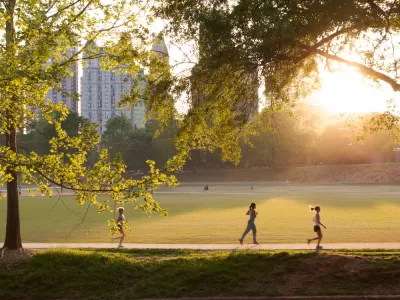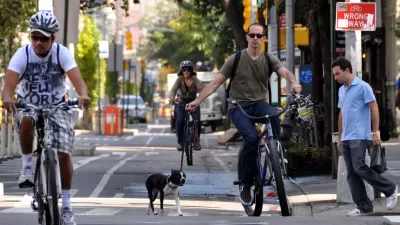A new Regional Plan Association initiative is assessing potential solutions to historic inequities in planning policy.

The Regional Plan Association announced the second phase of its Healthy Regions Planning Exchange program in a press release on February 18. The initiative "creates larger opportunities for communities to live full and healthy lives" through a comprehensive analysis of how planning policies have shaped health inequities in U.S. cities and programs that support local organizations in deepening their equity work. The second phase will "elevate best practices for addressing racial and health equity" and support participants in sharing resources and developing programs that "address structural inequities in transportation, housing, land use, and the environment."
The RPA "convened this national network of planners, practitioners, advocates, and community-based representatives" over the last two years to "develop solutions for reversing the impacts and influence of racism on urban planning and on cities across the US." Member organizations can learn from the experiences of other cities and explore "the intersections between the planning realms of transportation, the environment, and housing with the social determinants of health, climate justice, economy, health, trauma in the built environment and so much more." The regional partnerships started in the first phase will "effective responses to COVID-19 while beginning to address the roots of racial inequities which affect community health."

Maui's Vacation Rental Debate Turns Ugly
Verbal attacks, misinformation campaigns and fistfights plague a high-stakes debate to convert thousands of vacation rentals into long-term housing.

Planetizen Federal Action Tracker
A weekly monitor of how Trump’s orders and actions are impacting planners and planning in America.

In Urban Planning, AI Prompting Could be the New Design Thinking
Creativity has long been key to great urban design. What if we see AI as our new creative partner?

King County Supportive Housing Program Offers Hope for Unhoused Residents
The county is taking a ‘Housing First’ approach that prioritizes getting people into housing, then offering wraparound supportive services.

Researchers Use AI to Get Clearer Picture of US Housing
Analysts are using artificial intelligence to supercharge their research by allowing them to comb through data faster. Though these AI tools can be error prone, they save time and housing researchers are optimistic about the future.

Making Shared Micromobility More Inclusive
Cities and shared mobility system operators can do more to include people with disabilities in planning and operations, per a new report.
Urban Design for Planners 1: Software Tools
This six-course series explores essential urban design concepts using open source software and equips planners with the tools they need to participate fully in the urban design process.
Planning for Universal Design
Learn the tools for implementing Universal Design in planning regulations.
planning NEXT
Appalachian Highlands Housing Partners
Mpact (founded as Rail~Volution)
City of Camden Redevelopment Agency
City of Astoria
City of Portland
City of Laramie





























